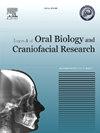探索知识差距:印度牙科学生对牙科人工智能的观点和伦理意识的混合方法横断面研究
Q1 Medicine
Journal of oral biology and craniofacial research
Pub Date : 2025-08-15
DOI:10.1016/j.jobcr.2025.08.005
引用次数: 0
摘要
在医疗保健领域,人工智能(AI)已成为一种强大的工具,具有增强诊断、治疗计划和患者护理的潜力。这项综合调查是在印度的牙科学生中进行的,以更好地了解他们对人工智能在牙科中的整合的知识、态度和看法。材料和方法设计了一份结构化问卷,包括封闭式和开放式问题,以收集有关学生人口统计信息、知识、态度和对牙科人工智能的看法的数据。此外,还评估了他们对人工智能使用相关伦理考虑的看法。这项调查是在印度15个不同州的1256名牙科学生中使用谷歌表格进行的。采用描述性统计和卡方检验等推理统计分析得到结果。结果1256名牙科学生参与了调查,他们对牙科领域的人工智能持积极态度,94%的人认为人工智能将导致牙科领域的重大进步,79%的人认为人工智能令人兴奋。人工智能的诊断能力很高,89%的人认为它可以明确使用,85%的人认为它可以用于预后目的。超过90%的人支持人工智能用于龋齿、牙周病、颌骨病变和软组织病变的放射诊断。然而,59%的人不认为人工智能可以取代牙医。人工智能应用的知识随着学习年限的增加而增加,其中研究生的认知度最高。然而,只有26%的参与者意识到在牙科中使用人工智能的伦理影响,而44%的人不知道,30%的人不确定。大多数参与者都意识到将人工智能整合到牙科中的潜在好处。在牙科教育中教授人工智能时,有必要把重点放在对学生的道德问题教育上。本文章由计算机程序翻译,如有差异,请以英文原文为准。
Exploring knowledge gaps: A mixed-method cross-sectional study on Indian dental students’ perspectives and ethical awareness on artificial intelligence in dentistry
Introduction
In the realm of healthcare, Artificial Intelligence (AI) has emerged as a powerful tool with the potential to enhance diagnostics, treatment planning, and patient care. This comprehensive survey was conducted among dental students in India to better understand their knowledge, attitudes, and perceptions of the integration of AI in dentistry.
Materials and method
A structured questionnaire that consisted of both closed-ended and open-ended questions was designed to gather data on the students’ demographic information, knowledge, attitudes, and perceptions towards AI in dentistry. Additionally, their perspectives on ethical consideration related to AI use was also evaluated. The survey was carried out using Google Forms among 1256 dentistry students from 15 different states in India. Descriptive statistics, and inferential statistical analysis such as Chi-square test were performed to obtain the results.
Results
1256 dental students responded to the survey and there was a predominantly positive view towards AI in Dentistry. 94 % believed AI would lead to significant advances in dentistry, with 79 % finding it exciting. AI's diagnostic capabilities were high, with 89 % agreeing it can be used definitively and 85 % for prognostic purposes. Over 90 % supported AI for radiographic diagnosis of dental caries, periodontal disease, jaw pathologies, and soft tissue lesions. However, 59 % disagreed that AI could replace dentists. Knowledge of AI applications increased with the year of study, with postgraduate students showing the highest awareness. However, only 26 % of participants were aware of the ethical implications of using AI in dentistry, while 44 % were unaware and 30 % were unsure.
Conclusion
Most of the participants were aware of the potential benefits of integrating AI in dentistry. There is a need to focus on educating students about ethical concerns when teaching AI in dental education.
求助全文
通过发布文献求助,成功后即可免费获取论文全文。
去求助
来源期刊

Journal of oral biology and craniofacial research
Medicine-Otorhinolaryngology
CiteScore
4.90
自引率
0.00%
发文量
133
审稿时长
167 days
期刊介绍:
Journal of Oral Biology and Craniofacial Research (JOBCR)is the official journal of the Craniofacial Research Foundation (CRF). The journal aims to provide a common platform for both clinical and translational research and to promote interdisciplinary sciences in craniofacial region. JOBCR publishes content that includes diseases, injuries and defects in the head, neck, face, jaws and the hard and soft tissues of the mouth and jaws and face region; diagnosis and medical management of diseases specific to the orofacial tissues and of oral manifestations of systemic diseases; studies on identifying populations at risk of oral disease or in need of specific care, and comparing regional, environmental, social, and access similarities and differences in dental care between populations; diseases of the mouth and related structures like salivary glands, temporomandibular joints, facial muscles and perioral skin; biomedical engineering, tissue engineering and stem cells. The journal publishes reviews, commentaries, peer-reviewed original research articles, short communication, and case reports.
 求助内容:
求助内容: 应助结果提醒方式:
应助结果提醒方式:


